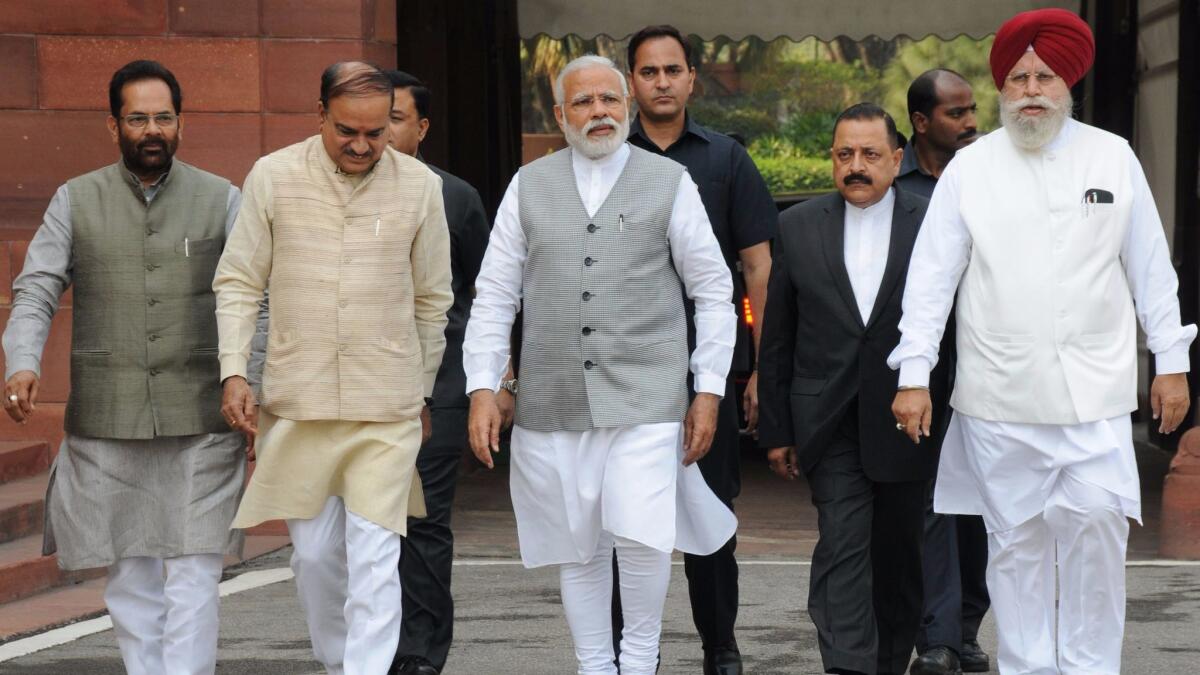India is about to make it easier for political parties to hide where their money comes from

- Share via
Reporting from MUMBAI, India — Since taking office nearly three years ago, Prime Minister Narendra Modi has pledged to clean up India’s notoriously corrupt political system.
His signature policy so far — abolishing large currency notes that accounted for 86% of the cash in circulation — was billed as a strike against undocumented “black money,” much of which flows into the coffers of political parties and candidates and makes tracking campaign finance almost impossible.
But Modi’s government might have made electoral financing in India even more opaque with a series of measures that critics say will undermine public trust in the world’s largest democracy.
A finance bill approved by lawmakers last week would enable individuals to make large political donations anonymously — by purchasing bank certificates redeemable by parties — and eliminate limits on corporate contributions to parties.
Modi’s government argues the measures will improve transparency because the contributions would be channeled through the formal banking system, reducing the use of cash. But watchdog groups say the moves will only increase the influence of major companies and special interest groups over a political system that many Indians already believe is rigged in favor of the powerful.
“The changes in the finance bill were billed as improvements in the transparency of political funding,” said Milan Vaishnav, an India expert at the Carnegie Endowment for International Peace in Washington and author of “When Crime Pays,” a book about money and criminality in Indian politics.
“Yet, with these alterations, 100% anonymous corporate giving — stripped of any limits — is now not only legal, it is encouraged.”
Few would argue that campaign finance in India desperately needs an overhaul. The Assn. for Democratic Reforms, an election watchdog, released a study this year that found nearly 70% of political contributions in India came from undisclosed sources.
Parties reported more than $1.7 billion in income from 2004 to 2015. But loopholes, including a law stipulating that the sources of individual cash contributions of less than $300 did not have to be disclosed, have long meant that there is almost no paper trail for large chunks of campaign cash.
Modi’s government has reduced that limit to $30. But because there is no cap on the number of such contributions, and there are plenty of opportunities to fudge receipts, experts say parties could in effect take in an unlimited number of $29 donations.
“The state has given legitimacy to opacity,” Vaishnav said.
The changes were passed Wednesday by the lower house of Parliament, where Modi’s Bharatiya Janata Party has a majority, after scant debate and with relatively little notice from mainstream Indian media.
They appear set to become law because Finance Minister Arun Jaitley appended them to a bill that involves government spending and by law does not need the assent of the upper house, which is held by the opposition.
Modi campaigned on his ability to jump-start India’s economy, and his party has a reputation for being business-friendly. But as the cost of Indian elections has skyrocketed, corporate interests have poured money over the years into both Modi’s party and the other national party, the Indian National Congress.
Last year, Modi’s government instituted a rule that eased contributions to political parties from foreign sources, while at the same time clamping down on nonprofit groups dependent on overseas funding.
Until now, a law prevented corporations from contributing more than 7.5% of their net profits to political parties. The changes would do away with both the cap and the requirement that the company disclose the party to which it donated.
“In theory a business house can donate all its profits to a political party, and nobody will ever know which political party this company has donated to,” said Jagdeep Chhokar, founding member of the Assn. for Democratic Reforms.
If enacted, the changes will further erode Indians’ trust in their elected officials, he said.
“People don’t think very highly of politicians, here and around the world,” Chhokar said. “Parties can improve that image only when they come clean.”
Parth M.N. is a special correspondent.
Follow @SBengali on Twitter for more news from South Asia
More to Read
Sign up for Essential California
The most important California stories and recommendations in your inbox every morning.
You may occasionally receive promotional content from the Los Angeles Times.














